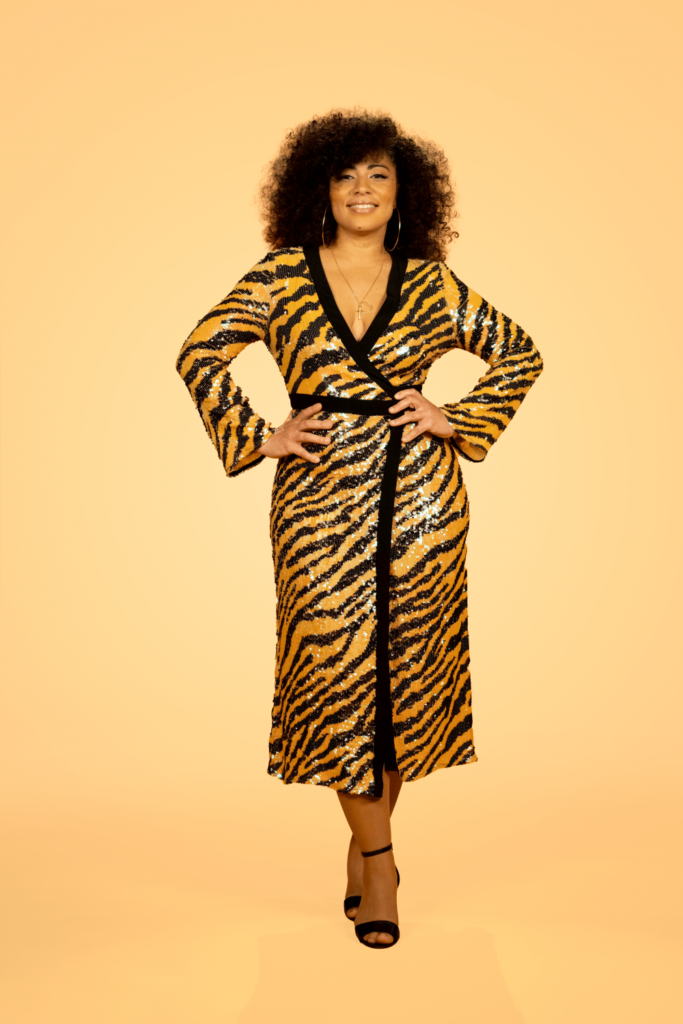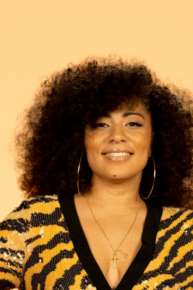
Grad Angeline Tetteh-Wayoe hosts Canada’s first national radio show devoted to Black music
Words: Bryan Alary | Images: Supplied1 Mar, 2021 ALUMNICULTURE
CBC’s The Block airs weeknights at 7 p.m.
As the youngest of three siblings in a busy household, AngelineWayoe (Radio and Television – Radio ’00) most definitely did not have remote control privileges.
The TV, like much of her life to that point, was controlled by someone else, someone older. When she needed a space of her own – where she could make her own choices – she retreated to music and the likes of artists Otis Redding, Aretha Franklin, Marvin Gaye and the Pointer Sisters.
“We had records and people loved music, but nobody was as obsessed with it as I was. That was a place for me,” recalls Tetteh-Wayoe. “All I did was listen to music, and sing, and write down the lyrics to songs.”
As she got older, Tetteh-Wayoe started writing her own music, lyrics and raps. But it wasn’t until she discovered hip-hop shows on college radio that she, as a Black woman and first-generation Canadian in Edmonton, found a space where she felt she truly belonged.
“It’s unfair to grow up where you’re told that certain things are off-limits to you based on the colour of your skin, or certain spaces are off-limits to you,” she says. “So that was an epiphany moment for me. I’m like, ‘I’m allowed to be here, I belong here. I spent my whole life being ostracized.’”
“It’s unfair to grow up where you’re told that certain things are off-limits to you based on the colour of your skin.”
Tetteh-Wayoe hopes to create a similar place of belonging for others through her new show, The Block, which debuted on CBC Radio in February, Black History Month. It’s Canada’s first national radio show dedicated to Black music and exploring the cultural contributions of artists across genres such as soca, pop, R&B, hip-hop and funk.

Shows offer up a mosaic of artists from Winnipeg hip-hop group The Lytics to R&B singer Deborah Cox, funk-soul-hip-hop fusion group Tank and the Bangas, to old-school favourites by the likes of Queen Latifah and A Tribe Called Quest.
We caught up with Tetteh-Wayoe to talk about her hopes for the new show, her undying passion for radio after two decades working at stations in Edmonton, Calgary and Toronto, and how the medium is still relevant in the age of streaming.
Techlifetoday
This is the first show focused on Black music for a national audience. How do you feel about that?
Angeline Tetteh-Wayo
I never really thought something like this would happen at CBC, so I take it very seriously. This is a huge, monumental thing. More than anything, it comes with a great responsibility – responsibility to the community, responsibility to be strong, to be representative.
“I have a lot of responsibility in making sure it is a success.”
I have a lot of responsibility in making sure it is a success. A lot of times – and you will hear this from a lot of marginalized groups and people who exist outside mainstream white, North America – when you are the first person to do something, if it’s not done well, people won’t give you a chance to do it again. Who knows if someone else will ever get the opportunity again?
What would a show like this have meant to you growing up in Edmonton?
It would have given me a chance to see what was possible. To have found a place on terrestrial radio, where I could sit in my room and just turn on the radio, listen to music, and to even hear someone speak that looked like me, would have opened my mind to many more possibilities that were available to me in the world in general.
The show launched Feb. 1. What have the last three or four weeks been like for you?
It’s a different kind of radio [at CBC] than I think what you’re trained for in private [radio] or even in school, which is suited to a commercial style of radio. The way CBC does it, it’s much more research heavy. You have to know a lot and you have to write a lot. So I am in it – writing shows every single day, researching artists every single day, writing, recording and producing something that is entertaining and informative, and enjoyable – politically and intellectually. It’s labour intensive, but it’s a labour of love.
“It’s labour intensive, but it’s a labour of love.”
What are your hopes for the show?
My hope for this show is that it will be a place of belonging, and adventure, and of love. And we keep moving forward, creating beautiful playlists every day that explore a beautiful mosaic of sounds.
I think it’s easier to navigate a very dense musical forest – and that’s what it’s really become; you know, streaming is beautiful and everything, but it’s easy to get lost in it. What am I listening to and why am I listening to the same thing that sounds like the same thing [I heard before] and the same thing before that?
So this is an opportunity just to be able to diversify people’s sonic palettes, and also inform them at the same time and be a guide through a very crowded, musical landscape.
It’s time, Canada.
Meet us on The Block tonight at 7PM: https://t.co/Y69HWOpEOr pic.twitter.com/2eozWWJxhg— The Block (@TheBlockCBC) February 1, 2021
You’ve said the initial idea for the show was to create space to explore the hip-hop genre but that you wanted to open it up to a wider breadth of music by Black artists. Why was this important?
I wanted to show the extent of creation and innovation, and the extent that Black people push the culture forward. And how much music of Black origin is loved across the board, not just by Black people, but by everyone. I didn’t want to lock anybody out. I wanted to make room for the trap artists and I also want to make room for the East Coast acoustic folk artists. So much of modern-day music was born in the lives of Black people – in the lives of Black suffering, especially in the United States of America.
“I wanted to show the extent of creation and innovation, and the extent that Black people push the culture forward.”
What made you decide to get into radio?
It was one of those sort of magical moments, when I was about 10 or maybe I was older in junior high. For a project for school, I had done a radio commercial using a tape recorder. I just remember my friend’s dad had heard it and he said just off the cuff, “You know, your voice is really nice to listen to.” And that was it.
You mentioned your parents came to Canada for their education and that they’re both academics. How did they feel about your decision to take a different route?
I didn’t even want to go to post-secondary. I was like, “I need to live my life.” My father, more than anyone, was pressuring me to just do something – anything. And so he gave me a calendar – one for NAIT and one for Grant MacEwan. He was just like, “Could you just take something, please?”
“My eyes bulged out of my head when I saw the [Radio and TV] program at NAIT.”
I started flipping through it and my eyes bulged out of my head when I saw the [Radio and TV] program at NAIT. I was like, this is a thing? Thank God for my dad giving me that damn book!
The radio industry has gone through a lot of changes during your career, and we’ve seen recently the closure of several stations in urban Canadian markets. What would you say to students thinking about a career in radio?
What I’ve found is that there are only a few souls that actually have a passion for this. And those ones that have a passion for it will see it through. They will carry the legacy of what I still believe to be a very powerful form of media.
“I think radio is an intimate form of connecting with someone. To hear a human voice speak to you.”
Everything comes back around again and there needs to be a focus on connection. Because we are in a world that is more and more disconnected. And I think radio is an intimate form of connecting with someone. To hear a human voice speak to you. You know, in your ear, it’s a comfort, it’s a touchstone – that same person, at that same time. It’s a beautiful thing, man.
Source: Tech Life Today

